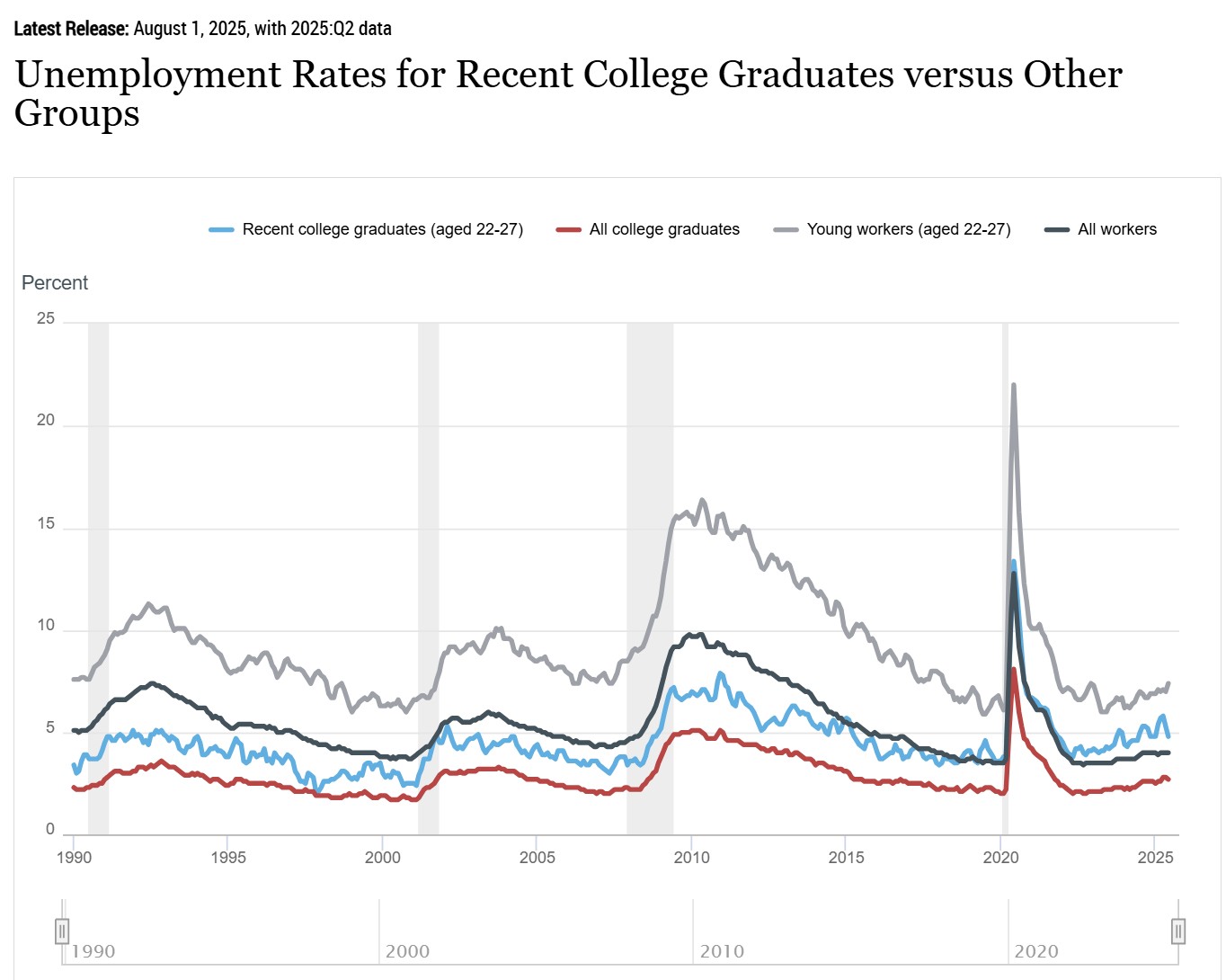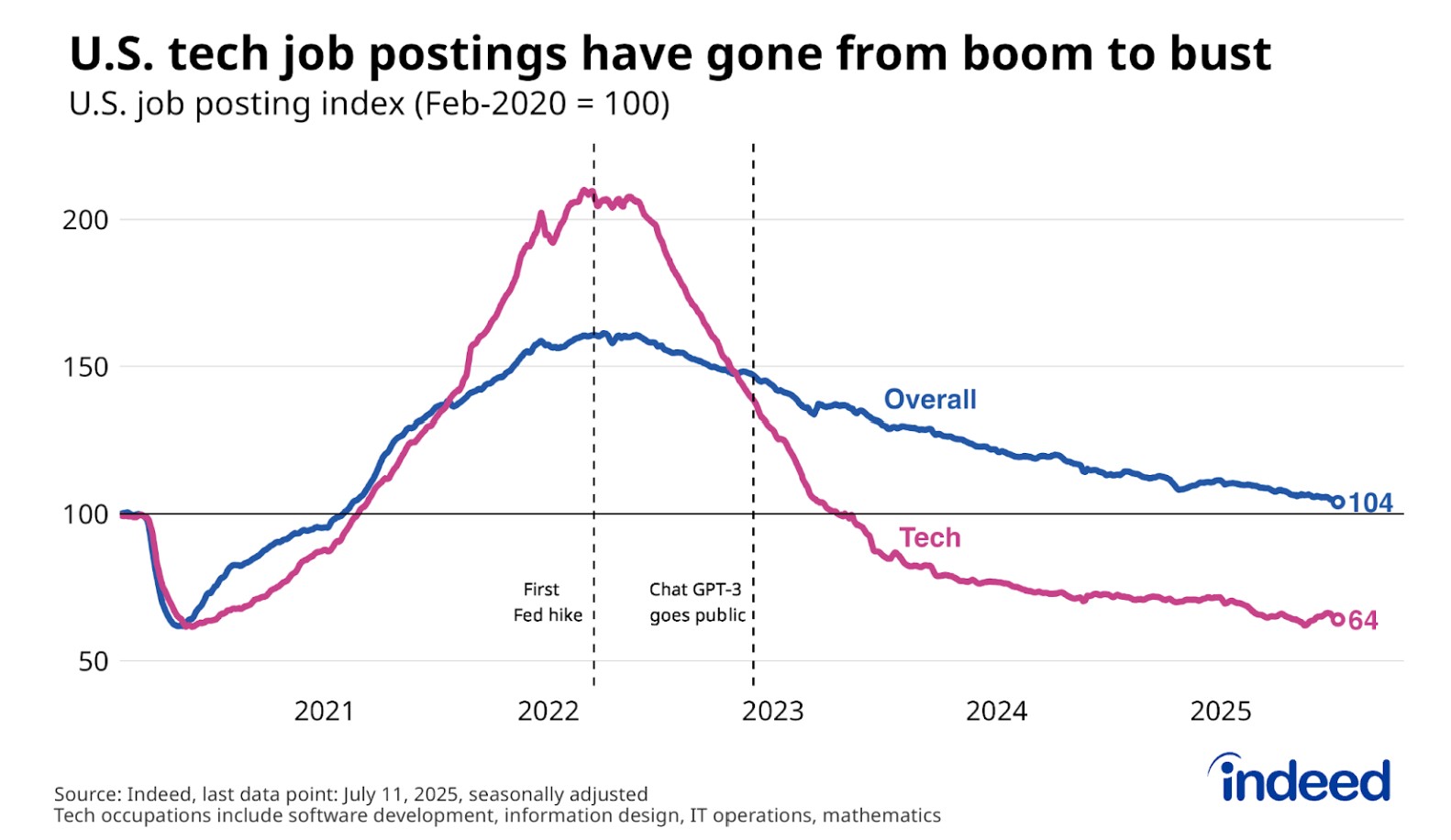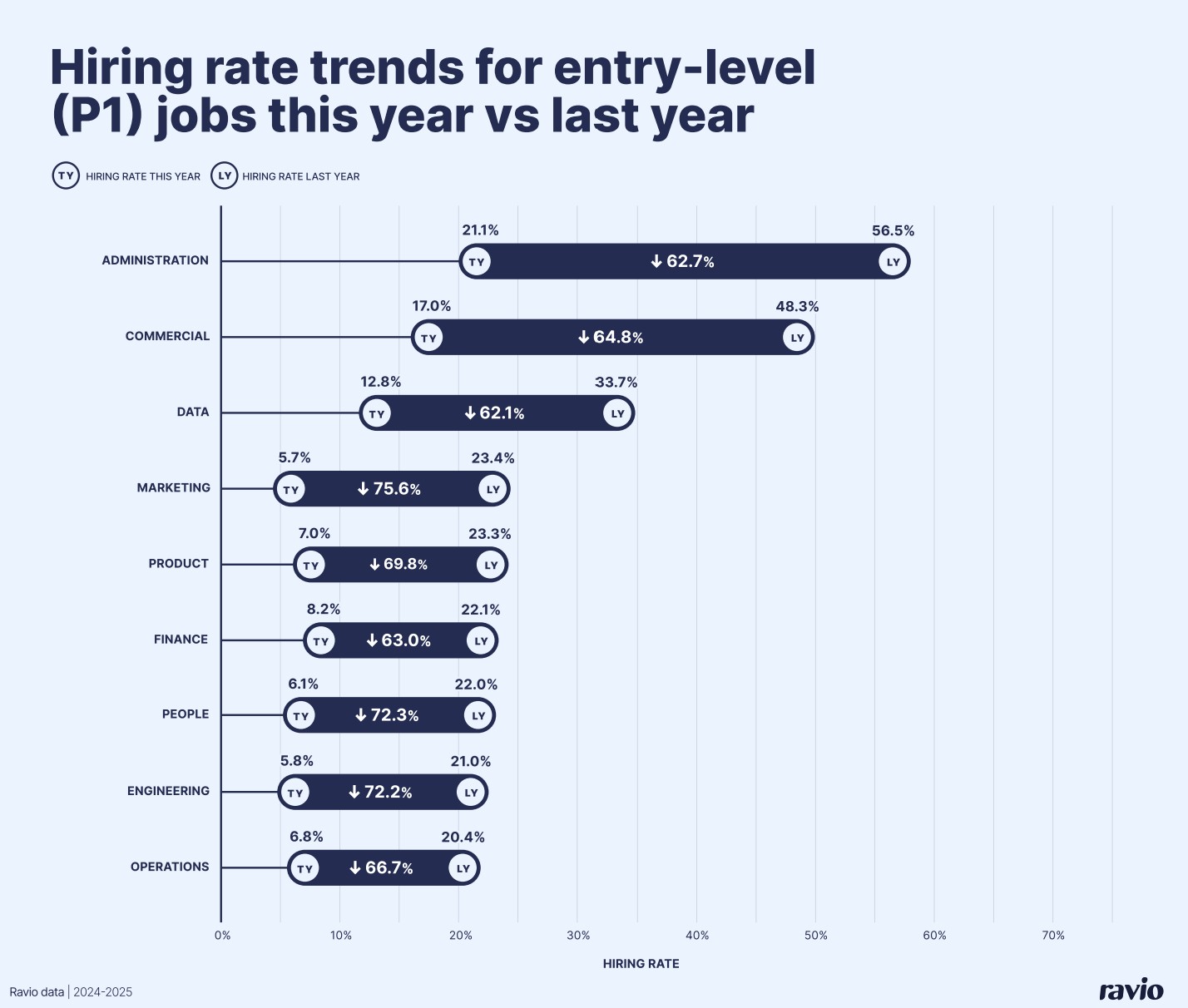Entry-Level Jobs Are Vanishing — Here's How to Stay Ahead of the AI Curve
Recent college graduates face an impossible job market as AI eliminates entry-level roles. Discover how to adapt your strategy and leverage technology to find opportunities in 2025.
Graduation once meant entering a world full of entry‑level roles where you could learn the ropes. Today, many new graduates feel like they're "throwing résumés into a black hole." In fact, 4.8% of recent college graduates can't find jobs in 2025 according to the Federal Reserve Bank of New York. So what's going on? The short answer is that artificial intelligence is eating the bottom rung of the career ladder.
## AI is devouring entry‑level roles
Entry‑level jobs used to consist of routine tasks: answering phones, filing, scheduling meetings and doing basic research. Modern AI can now handle these activities more efficiently than humans, and employers are taking notice. A Goldman Sachs analysis warns that up to 300 million full‑time jobs worldwide could be affected by AI. Fortune's data shows that entry‑level job postings in the U.S. have dropped by ~35% since January 2023.
 AI isn't just replacing tasks — it's filtering applicants. Large companies receive hundreds or thousands of résumés per opening, so they use Applicant Tracking Systems (ATS) to scan for keywords and reject anyone who doesn't meet rigid criteria. A Harvard Business School / Accenture study found that 88% of employers believe qualified candidates are screened out because of these automated filters. AI tools are simultaneously shrinking the number of entry‑level jobs and making it harder to land the few that remain.
## Tech companies illustrate the problem
Big tech firms have cut new‑graduate hiring by more than 50% since 2019. Average age for technical hires has increased because companies want workers who already know the ropes — not junior employees they need to train. In San Francisco, more than 80% of "entry‑level" roles now require two years of experience. Even within the broader tech industry, U.S. tech job postings have fallen 36% since early 2020, although AI‑focused roles such as machine‑learning engineers are up 59%.
AI isn't just replacing tasks — it's filtering applicants. Large companies receive hundreds or thousands of résumés per opening, so they use Applicant Tracking Systems (ATS) to scan for keywords and reject anyone who doesn't meet rigid criteria. A Harvard Business School / Accenture study found that 88% of employers believe qualified candidates are screened out because of these automated filters. AI tools are simultaneously shrinking the number of entry‑level jobs and making it harder to land the few that remain.
## Tech companies illustrate the problem
Big tech firms have cut new‑graduate hiring by more than 50% since 2019. Average age for technical hires has increased because companies want workers who already know the ropes — not junior employees they need to train. In San Francisco, more than 80% of "entry‑level" roles now require two years of experience. Even within the broader tech industry, U.S. tech job postings have fallen 36% since early 2020, although AI‑focused roles such as machine‑learning engineers are up 59%.
 ## Which fields are most at risk?
New data from Ravio reveals that entry‑level hiring rates (P1 positions) fell 73% on average between 2024–2025. The decline is much steeper than the 7% drop across all job levels. The hardest‑hit fields include marketing, people/HR, engineering, product, operations, commercial, finance, data, and administration. These jobs tend to be routine and task‑based, making them prime targets for automation.
## Which fields are most at risk?
New data from Ravio reveals that entry‑level hiring rates (P1 positions) fell 73% on average between 2024–2025. The decline is much steeper than the 7% drop across all job levels. The hardest‑hit fields include marketing, people/HR, engineering, product, operations, commercial, finance, data, and administration. These jobs tend to be routine and task‑based, making them prime targets for automation.
 The original article offers several strategies: learn to use AI tools (rather than compete with them), build an AI‑powered portfolio of projects, target roles that rely on human judgment and creativity, and pursue alternative credentials like certifications.
## New opportunities: micro‑internships and project‑based work
One way to gain experience despite the entry‑level squeeze is through micro‑internships. Parker Dewey describes these short‑term, paid, professional projects as a way for students and recent graduates to test different industries, build networks and get paid fairly. Because micro‑internships last anywhere from a few days to a few weeks, they fit easily into busy schedules and provide tangible achievements you can add to your résumé. Many companies treat these projects as a pipeline for full‑time hiring.
Micro‑internships also bypass traditional ATS filters. Instead of competing against thousands of résumés, you are evaluated on your work product. Sites such as Parker Dewey offer hundreds of projects across marketing, data, HR, finance and operations. Completing several micro‑internships shows employers that you can deliver results and adapt quickly to new environments. Combined with AI tools, these experiences can give you the portfolio needed to stand out.
## New AI‑specific roles are emerging
Although generic entry‑level jobs are shrinking, AI‑specific junior roles are growing. The AI News Hub points out that positions like AI trainer/prompt engineer command salaries from $90,000–$140,000 and are experiencing a 400% increase in job postings. These roles involve teaching AI systems and optimizing human‑AI interactions. Companies are hungry for employees who understand how generative models work and can fine‑tune them for specific tasks. However, only 2% of the workforce currently has these skills.
If you're interested in this path, begin by building foundational skills in Python, data analysis and machine learning. Participate in open‑source projects or contribute to AI communities. Completing a micro‑internship that involves prompt engineering or data annotation can also demonstrate your aptitude. Certifications from Google, Microsoft or AWS can further validate your skills.
## How SimpleApply can help
SimpleApply is designed to navigate the new hiring landscape. Our AI‑powered platform matches you with roles that fit your profile, helps you optimize your résumé for ATS algorithms and even recommends micro‑internships or entry points into AI‑focused careers. We also provide insights into which industries are hiring and what skills you need to develop.
By leveraging SimpleApply's tools, you can:
**Identify AI‑resistant roles.** Our algorithms surface jobs that require human creativity, relationship‑building or physical presence.
**Build an AI‑powered portfolio.** We suggest projects and courses tailored to your career goals and guide you through building a strong body of work.
**Stay ahead of the curve.** Our weekly insights keep you informed about emerging roles like prompt engineering and tell you where the opportunities are growing.
Ready to take control of your career? Sign up at SimpleApply and use AI to discover your next opportunity. Don't let automation close the door — let it open a new one.
The original article offers several strategies: learn to use AI tools (rather than compete with them), build an AI‑powered portfolio of projects, target roles that rely on human judgment and creativity, and pursue alternative credentials like certifications.
## New opportunities: micro‑internships and project‑based work
One way to gain experience despite the entry‑level squeeze is through micro‑internships. Parker Dewey describes these short‑term, paid, professional projects as a way for students and recent graduates to test different industries, build networks and get paid fairly. Because micro‑internships last anywhere from a few days to a few weeks, they fit easily into busy schedules and provide tangible achievements you can add to your résumé. Many companies treat these projects as a pipeline for full‑time hiring.
Micro‑internships also bypass traditional ATS filters. Instead of competing against thousands of résumés, you are evaluated on your work product. Sites such as Parker Dewey offer hundreds of projects across marketing, data, HR, finance and operations. Completing several micro‑internships shows employers that you can deliver results and adapt quickly to new environments. Combined with AI tools, these experiences can give you the portfolio needed to stand out.
## New AI‑specific roles are emerging
Although generic entry‑level jobs are shrinking, AI‑specific junior roles are growing. The AI News Hub points out that positions like AI trainer/prompt engineer command salaries from $90,000–$140,000 and are experiencing a 400% increase in job postings. These roles involve teaching AI systems and optimizing human‑AI interactions. Companies are hungry for employees who understand how generative models work and can fine‑tune them for specific tasks. However, only 2% of the workforce currently has these skills.
If you're interested in this path, begin by building foundational skills in Python, data analysis and machine learning. Participate in open‑source projects or contribute to AI communities. Completing a micro‑internship that involves prompt engineering or data annotation can also demonstrate your aptitude. Certifications from Google, Microsoft or AWS can further validate your skills.
## How SimpleApply can help
SimpleApply is designed to navigate the new hiring landscape. Our AI‑powered platform matches you with roles that fit your profile, helps you optimize your résumé for ATS algorithms and even recommends micro‑internships or entry points into AI‑focused careers. We also provide insights into which industries are hiring and what skills you need to develop.
By leveraging SimpleApply's tools, you can:
**Identify AI‑resistant roles.** Our algorithms surface jobs that require human creativity, relationship‑building or physical presence.
**Build an AI‑powered portfolio.** We suggest projects and courses tailored to your career goals and guide you through building a strong body of work.
**Stay ahead of the curve.** Our weekly insights keep you informed about emerging roles like prompt engineering and tell you where the opportunities are growing.
Ready to take control of your career? Sign up at SimpleApply and use AI to discover your next opportunity. Don't let automation close the door — let it open a new one.

Unemployment rates for recent college graduates versus other groups (New York Fed data)

Indeed's data shows that U.S. tech job postings plunged after 2021 while overall job postings declined more slowly

Entry-level hiring is down dramatically across multiple business functions; marketing roles, for instance, fell by 75.6%


